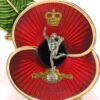Artillery being charged.
Home › Forums › Historical › Black Powder › Artillery being charged.
- This topic has 6 replies, 5 voices, and was last updated 3 years, 9 months ago by
 Nat.
Nat.
-
AuthorPosts
-
July 1, 2021 at 6:21 pm #185830
Keith Davison
ParticipantForgive the question from a newb to BP, but I had a game last night and a question arose that neither I nor my opponent could answer.
Picture the scene, an undamaged cavalry unit charges a cannon. In closing fire, 2 hits are inflicted on the cavalry but it passes it break test and closes in for the combat. Battles ensues, but after the attacks and saving throws neither side has inflicted any hand-to-hand casualties.
Question 1. Is this classed as a draw, in which case whilst the cavalry takes a break test what does the artillery do? I could see rules for infantry but not artillery in this situation. Do they take a break test, ie they would break as per all close combat tests.
Question 2. Do the two casualties inflicted in the closing fire count towards the combat resolution? Ie in my example did the cavalry have 2 against it and therefore losing the combat?
I can’t rule out an inability to read properly when we checked the rules, but we couldn’t see a solution?
ThanksJuly 1, 2021 at 6:55 pm #185831 Big AlParticipant
Big AlParticipantAnswering in reverse
2) No, casualties caused by closing fire do not count towards Combat Resolution, but they do count in the following break test if that unit loses the combat.
1) the combat is a draw. Neither side has to take a break test because neither side lost. Nor did either side become shaken (stamina level reached) so again, no break test required. After a drawn combat, any unit that is shaken must take a break test. It does not mean that the other side won, it is still a drawn combat. Indeed, both sides could be shaken and so take a break test.
after a drawn combat, all cavalry retires. No break test required, they just fall back.
Hope that clarifies for you.
July 1, 2021 at 8:12 pm #185832 Garry WillsParticipant
Garry WillsParticipantSo the cavalry passed the charge to contact break test using the shooting line on the break test, as in the FAQ 2010, rather than the RAW.
July 1, 2021 at 8:56 pm #185833Mike
ParticipantThe FAQ that Garry refers to…
The Quick Reference Sheet (QRS) states that a break test is required for units suffering artillery casualties
from closing fire (b. Test if Shaken or suffering artillery casualties from closing fire). Because the best
result that cavalry can get from such a test is ‘retire’ this makes it practically impossible for cavalry to
charge home onto artillery (they would have to suffer zero casualties from 3 shots per cannon requiring 3+
to hit and -2 saves).
This is a case of a rule being added a little late in the day and not quite being explained properly. Originally we had things
arranged so that only Shaken units tested – and this works well enough. After a while we felt that units taking artillery
casualties on the way in – but not being Shaken – should also have to test their resolve to see if they charged home. What we
failed to make clear is that this test should be taken using the Shooting results on the Break Test, and not the Hand-to-Hand
results as you would for a Shaken unit. As the testing unit would have charged into position at the point the test is made, a
result of ‘unit holds its ground’ means that the charge is successfully completed and the charger and artillery are engaged in
combat. With the usual -1 modifier for artillery casualties this means a test score of 7 or better will see the unit charge home
successfully.
Some players do prefer to use more artillery that we typically might – and the relatively narrow frontage of artillery pieces
does make closing fire from massed guns even more effective than reality would suggest. Where a unit charges onto multiple
guns we’d recommend allowing only a single gun to shoot closing fire – this is plenty dangerous enough without making such
attacks suicidalJuly 1, 2021 at 9:25 pm #185834Keith Davison
ParticipantThanks for these responses. I think it’s because it doesn’t mention artillery in the case of a drawn combat that we weren’t sure what to do.
July 1, 2021 at 10:52 pm #185835 Big AlParticipant
Big AlParticipantMike, I always wondered why the break test for Closing Fire used the Hand to Hand result, especially as the test, if taken at all, happens before any close combat had occurred. However, this has always been the case, even in the original rulebook. You just don’t charge artillery head on with cavalry because they’ll never make it. Skirmishers are the best thing for a frontal attack on artillery, really.
In Hand to Hand, Artillery is very weak and vulnerable. Every break test result is Break and it cannot be supported, so closing fire is the only real chance it has at surviving contact with the enemy.
July 2, 2021 at 8:07 am #185836 NatParticipant
NatParticipantIf you think your Napoleonic Artillery is going to end up in combat then Spanish is the way to go…..as they get to hold and not just break :p
-
AuthorPosts
- You must be logged in to reply to this topic.
